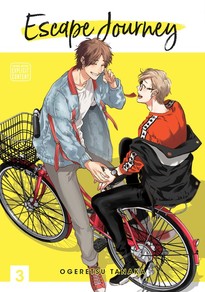Review
by Rebecca Silverman,Escape Journey
GN 3
| Synopsis: |  |
||
After a series of misunderstandings nearly broke them up, Taichi and Naoto reconcile – with a very public kiss. Now that all of their friends and classmates know that they're dating, the time has come to decide how (and if) they're going to tell their parents. They want to stay together forever, but will the rest of the world let them? |
|||
| Review: | |||
Escape Journey had, in a way, to escape from itself, or at least its first volume, which was fairly reliant on the kind of tropes that can make some readers turn away from a romance, BL or otherwise. It's one of those series that has gotten better as it's gone on, and now, in its third and final volume, it takes on a topic that much classic BL doesn't tend to go into: coming out. It's a relevant topic, and an important one, which may be why it is generally left to books that take a more “serious” tone in general, like Wandering Son or That Blue Sky Feeling; it's rarely fair to group an entire genre into one category, but the fact of the matter is that most of the BL released in English isn't looking to make a point or to present anything remotely resembling real life. That leaves it open to the sort of generalizations that romance as a genre gets, namely that it's escapism, unrealistic smut, or not being “literary” enough for serious readers. Escape Journey's first two volumes could be said to fall into all of those categories by romance's detractors, but it has been steadily building towards the idea that Naoto and Taichi were eventually going to do something more permanent while still indulging in explicit sex scenes and genre tropes. This final volume still includes those, from the uke/seme dynamic to the graphic sex scenes and a few other familiar genre standbys, but it also is trying to explore various results of the boys' public display of affection. Essentially three reactions are examined – complete rejection, complete acceptance, and indifference to the knowledge. Naoto's large, close family is perhaps the most rewarding of the people they tell, even if Naoto outs himself unintentionally when he hears his brother make a homophobic comment and gets angry. His mother and father simply want him to be happy, and if he loves Taichi, then that's fine with them. There's some good misdirection employed when his mother gives them some life advice, but the fact that she's using their age rather than gender as the basis for it makes it clear that neither parent objects to the two being together. The scene also gives a very clear sense of how Naoto's family functions as a unit, which is not only nice to see (and perhaps familiar if you come from one of those ethnicities where your parents are always your parents and never become your pals), but also forms a good contrast to the family situation Taichi comes from. We've known since volume one that he's had a difficult time with his parents since high school, and nothing quite drives home the way they care without caring as his coming out to them. His mother's hypocrisy when she speaks of the “fulfillment” of having children to the child she essentially abandoned is stunning, while his father's mild indifference, even as he accepts his son as gay, is such a far cry from Naoto's family that it really speaks volumes about Taichi's life before he met Naoto again. There's a real sense that Taichi's dad is going to try to be a better parent now, but Taichi's all grown up, so even if it isn't fully moot, there's a sense that it will never quite be enough. Perhaps the best moment with Taichi's family, however, is when his younger half-sister, who clearly understands what's going on at least in part, runs after him to give him a picture she drew of he and Naoto. There is hope, it implies, even if his parents aren't quite capable of being who he wanted them to be. As far as their peers go, the same mixed reactions prevail, with some friends rejecting them outright while others are just mad that the guys didn't trust them enough to tell them what was going on. In one striking scene, some of Naoto's guy friends are sitting around talking when one of them refers to their friendship with him in the past tense. Another friend yells at him, saying that the fact that Naoto and Taichi are dating doesn't change anything. At another point, a different friend stops a girl from taking a picture (or video) of Naoto and Taichi kissing, telling her that “it isn't a show.” These signs of support, even if the guys in question aren't necessarily aware of them, are heartening, and imply, like Akari's picture, that even if things won't always be easy in a world still unaccepting of them, there's definitely hope. In the end, Escape Journey proves to have been worth the ride. The artwork is attractive throughout and the story, by this volume, feels grounded in positive ways, which makes the story work better than it might have otherwise. This volume's color image isn't quite as good as the previous two, largely because Naoto and Taichi are wearing truly ugly (matching) denim outfits, but if you're looking for a short romance that's more than the usual single-volume BL release, this has proven itself to be worthwhile. |
| Grade: | |||
|
Overall : B
Story : B
Art : B
+ Good use of volume's theme, nice bookending with the final chapter, consent issues from volume one resolved |
|||
| discuss this in the forum (3 posts) | | |||
| Production Info: | ||
|
Full encyclopedia details about Release information about |
||